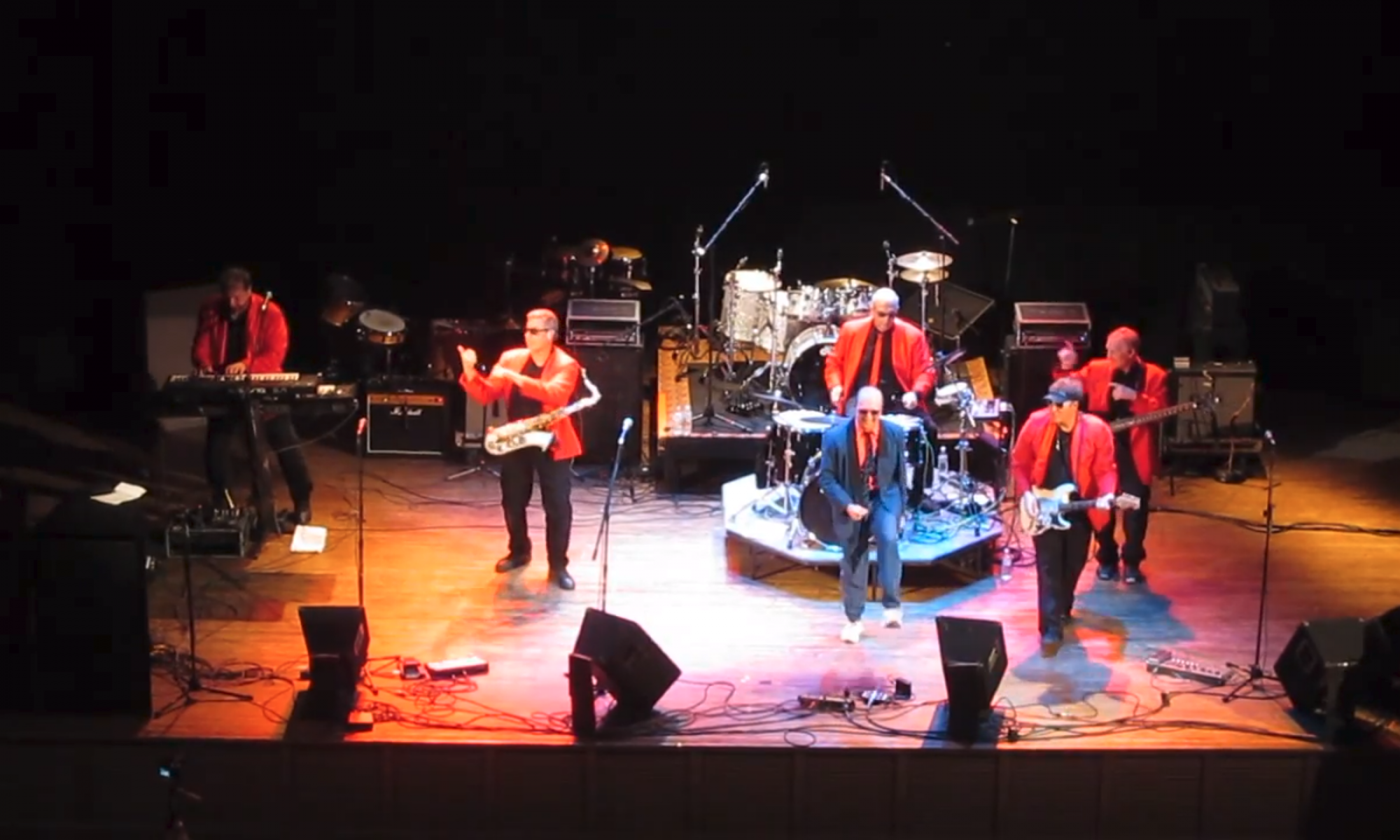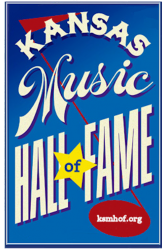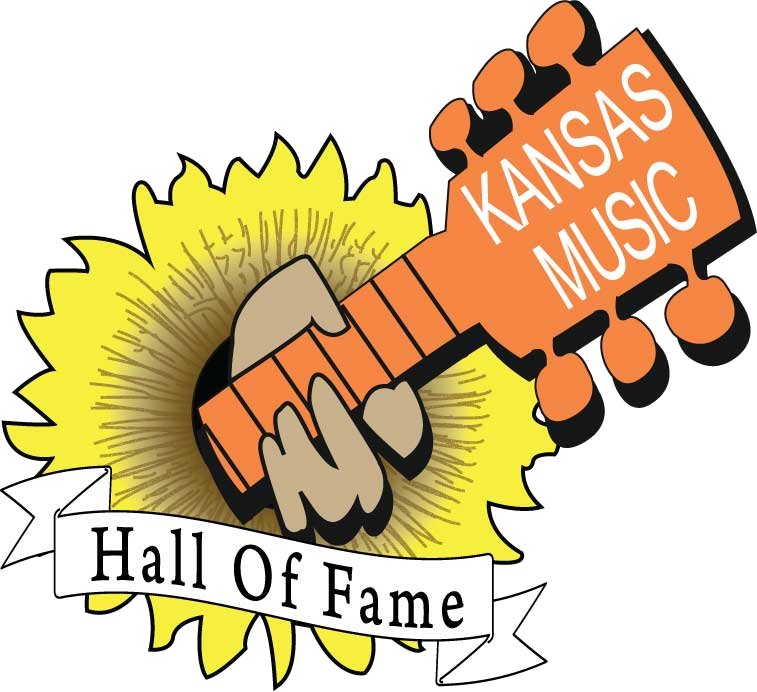 |
|
|
 |
William “Count” Basie, who died in 1984, was an American jazz pianist, organist, bandleader, and composer. Basie led his jazz orchestra almost continuously for nearly fifty years. Many notable musicians came to prominence under his direction, including tenor saxophonists Lester Young and Herschel Evans, trumpeters Buck Clayton and Harry “Sweets” Edison, and singers Jimmy Rusing and Joe Williams. Basie’s theme songs were “One O’clock Jump” and “April in Paris.”
The following year Basie became the pianist with the Bennie Moten Band based in Kansas City, inspired by Moten’s ambition to raise his band to the level of Duke Ellington’s or Fletcher Henderson’s. Where the Blue Devils were “snappier” and more “bluesy,” the Moten band was classier, more respected, and played in the “Kansas City stomp” style. In addition to playing piano, Basie was co-arranger with Eddie Durham, who actually did the notating. During a stay in Chicago, Basie recorded with the band. He occasionally played four-hand piano and dual pianos with Moten, who also conducted. The band improved with several personnel changes, including the addition of tenor saxophonist Ben Webster.
|
|
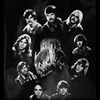
|
Central Standard Time evolved out of the last of the original Red Dogs in January, 1970. Kent Leopold, Evan Johnson, Randy Shaw, Bob Meyerhoeffer, Roger Walls, and Richard Tade were all members of the last original Roarin’ Red Dogs Band when it decided to leave the Midwest in its quest to make it big in the music business. Since not all of the Red Dogs wanted to make this move, Mitch Bible, Mike Redd, and Larry Church were added to the band that would soon become Central Standard Time. Kent Leopold and Evan Johnson were the leadership that landed the band its first gig in Boston in February, 1970. Before leaving Kansas, the band changed its name to Central Standard Time.
The original members of Central Standard Time, with instruments played and home town are: Kent Leopold, sax and flute (Coffeyville, Kansas); Evan Johnson, drums (Topeka, Kansas); Bob Meyerhoeffer, vocals and guitar (Hastings, Nebraska); Randy Shaw, drums and vocals (Council Grove, Kansas); Mike Redd, bass guitar and vocals (Wichita, Kansas); Richard Tade, Hammond B-3 and piano (Wichita, Kansas); Mitch Bible, lead guitar and vocals (Mulvane, Kansas); Roger Walls, trumpet and vocals (Rose Hill, Kansas); and Larry Church, trumpet (Wichita, Kansas). Later versions of the band featured: Greg Ayers, trombone; Doug Owen, vocals; Jim Doherty, drums; Dave Ferguson, lead guitar; Moose, drums; and Robbie Barker, organ.
|
|
 |
Drummer, producer, singer, and songwriter — James was born in Kansas City, MO, in 1939. As a teen he naturally took to the drums with the influence of his father Harold, who was a drummer in the legendary Kansas City scene. James eventually found his way to L.A. and joined the legendary 60’s funky soul group, Dyke & the Blazers, where he laid down drums on “let a woman be a woman” which later would be sampled by the Bomb Squad for Public Enemy’s “Welcome to the Terrodome.” After Dyke’s tragic murder and still in L.A., he and other members of the Blazers would end up forming The Watts 103rd Street Band and with the help of Bill Cosby hooked a record deal with Warner Bros. He wrote and sang on some songs like the soulful “dance a kiss & a song”. He played on the best known 103rd Street cuts like “Express yourself,” which was sampled by Dre for NWA’s “Express Yourself”. This was just the beginning for Gadson’s prolific career, which next found him in the mix with Bill Withers producing, writing, and playing on the soulcessful Still Bill LP, which featured “Use Me,” “Lean on Me,” and the funky “Kissing my Love,” which has been sampled to no end. The Jungle Brothers cut up his drums live for “Straight out the Jungle.” From there he became one the most sought out studio drummers, playing on 300 gold records at last count, though you would never suspect it from his ever-humble disposition. He played on Marvin Gaye’s “Let’s get it on,” the Saturday Night Fever soundtrack, Herbie Hancock’s Manchild, and most recently Beck, Paul McCartney, and Ray Charles discs. Currently he is doing more sessions and is a founding drummer of the Keepintime project with photographer B+.
|
|
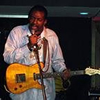 |
Rudy Love & the Love Family was a sibling group headed by eldest brother, Rudy. Over the years, non-siblings performed under the name, but Rudy remained the driving force; Love Family blood members are Bob, Gerald, Peggy, Denise, and Shirley. Rudy was born on September 15, 1948, in Oklahoma. Later the family moved to Wichita, Kansas. It was a large brood—Rudy has fourteen brothers and sisters.
He developed a love for singing and performing from his gospel singing musician father, Robert, and went from there. A touring singer, Robert crisscrossed the country as a performing musician with gospel and R&B artists. Rudy became the man of the house while his dad was away playing. Through his father, Rudy met many of the top names in music when they passed through Wichita. He formed his first group in grade school and went through many others before settling on Rudy Love & the Love Family while in college. The group performed locally but didn’t record.
|
|
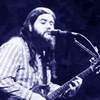 |
Wichita’s Pat McJimsey began heading up bands at the age of seventeen with Velvet Honey. Later he formed the Bear Valley Blues, the Entire British Nacy, and Four Brothers. Pat toured with John Manning, Finnegan & Wood, Leon Russell and Freddy King. Upon his death, the PAT (Performers Assistance Trust) was established by the Wichita Blues Society to offer financial help to musicians who cannot play due to major illness, accident or medical emergency, or to their survivors to help with final expenses.
Shortly before his death and due to many requests from his fans, Pat McJimsey digitally remastered the I Dig Girls album originally released in the 1980s. He was very excited about this re-release, and had plans to come out with a new “all blues album” later in the year.
Thanks to the magic of the Internet, and the devotion of his family and friends, Pat’s extraordinary talent lives on to be experienced here by old and new fans alike.
|
|
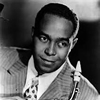 |
Charlie Parker was born in Kansas City, Kansas, and was raised in Kansas City, Missouri, as an only child. His dad was reportedly an alcoholic and often absent from Charlie’s life, though he may have influenced him musically. He was a pianist, dancer, and singer on the Theater Owner Booking Association, a vaudeville circuit for African American performers.
Parker began playing the saxophone at age eleven, and at age fourteen joined his school’s band using a rented instrument. One story holds that, without formal training, he was terrible and thrown out of the band. Experiencing periodic setbacks of this sort, at one point he broke off from his constant practicing.
It has been said that in early 1936 Parker participated in a “cutting contest” that included Jo Jones on drums, who tossed a cymbal at Parker’s feet in impatience with his playing. However, in the numerous interviews throughout his life, Jones made no mention of this incident. At this time Parker began to practice with great diligence and rigor, learning the blues “Cherokee,” and “rhythm changes” in all twelve keys. In this woodshedding period, Parker mastered improvisation and developed some of the ideas of bebop. In an interview with Paul Desmond, he said he spent three to four years practicing up to fifteen hours a day. It has been said that he used to play many other tunes in all twelve keys. The story, though undocumented, would help to explain the fact that he often played in unconventional concert pitch key signatures, like E (which transposes to C# for the alto sax).
Groups led by Count Basie and Bennie Moten were the leading Kansas City ensembles and undoubtedly influenced Parker. He continued to play with local bands in jazz clubs around Kansas City, Missouri, where he perfected his technique with the assistance of Buster Smith, whose dynamic transitions to double and triple time certainly influenced Parker’s developing style.
In 1938 Parker joined pianist Jay McShann’s territory band. The band toured nightclubs and other venues of the southwest, as well as Chicago and New York City. Parker made his professional recording debut with McShann’s band. It was said at one point in McShann’s band that he “sounded like a machine,” owing to his highly virtuosic yet nonetheless musical playing.
As a teenager, Parker developed a morphine addiction while in the hospital after an automobile accident and subsequently became addicted to heroin. Heroin would haunt him throughout his life and ultimately contributed to his death.
|
|
 |
Missouri has long boasted of being the home of two of America’s greatest artists, Mark Twain and Chuck Berry. It wasn’t until the Rainmakers thundered into the national music spotlight in 1986 that anyone combined the guitar power of Berry with the social wit of Twain into a unique brand of Missouri rock ’n’ roll.
Originally formed in 1983 as a three-piece bar band known as Steve, Bob, & Rich, the Kansas City rockers became an instant favorite throughout the Midwest. Soon, fans were standing in line to see this trio they described as “energetic” and “intense” but, most importantly, “fun.” Within months of finishing their first independent release, Steve, Bob, & Rich had signed a multi-album contract with Polygram Records, added a fourth member and changed their name to the Rainmakers.
Heralded as “America’s Great Next Band” by Newsday, the Rainmakers were soon drenched in critical acclaim. Feature articles in Newsweek, Rolling Stone, CMJ, USA Today, and others poured in, singing the praises of this hardworking Midwest band that provided new life to a traditional rock format.
Critics particularly enjoyed the unique writing style of Bob Walkenhorst, whose talent for choosing unusual and sometimes controversial subjects provided an eye-opening perspective of life, sprinkled with sarcastic humor. The Rainmakers received notoriety for their songs lyrical content, including music Connections award for Lyric Line of the Year—“The generation that would change the world is still looking for its car keys”—and in the unlikely source of author Stephen King, who twice quoted lyrics from Rainmakers songs in his bestseller The Tommyknockers, and again in his 1991 novel Gerald’s Game.
Success did not stop at the U.S. borders, as European countries supported the band increasingly with each new release. The song “Let My People Go-Go” gave the Rainmakers their first Top 20 single on the British charts. Critics abroad sang the band’s praises, with feature articles in New Musical Express, Kerrang, Rock Power, and others. Frequently, the Rainmakers could be spotted on European television with live appearances on Top of the Pops and The Tube, as well from video play on MTV Europe.
European concert dates grew in number each year, with the Rainmakers often enjoying headline status on festival bills. Their reputation as an electrifying concert act eventually led to the recording of a live album at a sold out show in Oslo, Norway, for release solely in Scandinavian markets.
In 1990, after four albums, five videos, more than 500,00 records sold, and concert dates too numerous to count, the Rainmakers put band business on hold to allow time for their personal lives and agendas. In 1994 the band returned to the studio to record a new album entitled Flirting with the Universe, an album that achieved gold certification in Norway within two months of release.
Overwhelmed by the response to Flirting with the Universe, the Rainmakers re-emerged from the studio in 1996 with Skin. With this effort, Bob Walkenhorst has again proved that no subject matter is too controversial by taking aim at pornography and its societal impact via his unique perspectives—a Rainmakers trademark. The album was a release which, in true Rainmaker form, was designed to provoke.
The Rainmakers are Bob Walkenhorst (vocals, guitar), Steve Phillips (lead guitar, vocals), Michael Bliss (bass, vocals) and Pat Tomek (drums).
|
|
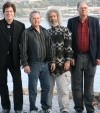 |
Riverrock is “one of the most popular bands in Kansas City History,” says the Kansas City Star/Times. Since 1974, Riverrock has been a name country music fans could count on for an exciting show of hot pickin’, tight harmonies and spontaneous fun. They have shared the stage with dozens of recording stars, the likes of Vince Gill, Trisha Yearwood, The Ozark Mountain Daredevils, Hank Williams, Jr., Alabama, Suzy Bogguss, The Oak Ridge Boys, Minnie Pearl, Charlie Daniels, Wanda Jackson, Jerry Lee Lewis, Tanya Tucker, Tracy Byrd and Emmylou Harris. Many of these performances were at state and county fairs, concert halls, music festivals, rodeos, college campuses and popular night clubs.
|
|
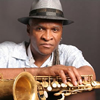 |
Best known for his work in the Jazz Messengers and Horizon, this post-bop alto saxophonist has recorded 26 albums as a bandleader and plays on nearly 100 others. He moved home to Kansas City in 2000 and currently serves as Director of Jazz Studies at UMKC. He still manages to balance live engagements around the world with teaching.
|
|
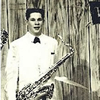 |
Saxophonist Jimmy Wilson has been part of the NE Kansas music scene for many years, beginning with Larry Emmett & The Sliders in the late Fifties. In the Seventies, he was part Lawrence’s Used Parts and other groups. More recently he has spent several years playing in Johnny I & The Receders.
|
|
 |
Following her debut album in 1994, the Academy of Country Music named Chely the Top New Female Vocalist in 1995. Her first Top 40 country hit came in 1997 with “Shut Up and Drive.” Two years later, her fourth album yielded a number-one single, the title track, “Single White Females.: Firmly established as a performer with record sales well over one million on various albums, she is also a successful songwriter. Her songs have been recorded by Brad Paisley, Richard Marx, Indigo Girls, Mindy Smith, and Clay Walker; among them Walker’s top-ten hit “I Can’t Sleep,” which won her a BMI award. Her memoir, Like Me, was released in 2005. She is an outspoken advocate for gay rights.
|
|
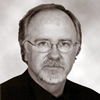 |
An independent record producer, Fundis’ credits include some of country music’s cream of the crop: Trisha Yearwood, Keith Whitley, Don Williams, Sugarland, Terri Clark, Alabama, Waylon Jennings, and Emmylou Harris, as well as New Grass Revival, Doc and Merle Watson, Sheryl Crow, and Townes Van Zandt. He has served as chairman of the board of trustees for the National Academy of Recording Arts & Sciences (NARAS) in 2001 through 2003, past trustee and president of the NARAS Nashville Chapter, and serves on the boards of the Grammy Foundation, MusiCares, and Alumnus of Leadership Music.
|
|
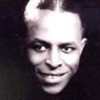 |
Born in Kansas, Jesse Stone began performing in his family’s minstrel show at the age of four. By the 1920s, he was leading a jazz band that included saxophonist Coleman Hawkins, a future jazz legend. Jesse Stone and His Blue Serenaders became a fixture of the Kansas City jazz scene.
Jesse Stone was one of the greatest songwriters of the rhythm and blues and rock ’n’ roll era. Much of his best known work was done at Atlantic Records, where he wrote, arranged, and played on some key sessions. His “Money Honey,” recorded by the Drifters, topped the R&B and pop charts for eleven weeks in 1953 and was covered by Elvis Presley early in his career. Another of Stone’s songs—“Sh-Boom,” by the Chords—was a doo-wop classic from 1954. “Shake, Rattle and Roll,” recorded by Big Joe Turner, Bill Haley and His Comets, and many others, became a turning point in early rock ’n’ roll history. The song served as a bridge to R&B for white teenagers.
Another standout from the era, “Your Cash Ain’t Nothing But Trash,” was a hit for the Clovers. As a musician, Stone led the house band on Chuck Wills’ rocking update of blues singer Ma Rainey’s “C.C. Rider.” On the jazz side, he wrote “Idaho,” which became a standard. Benny Goodman’s version topped the charts, and Guy Lombardo’s version reportedly sold more than three million copies. Stone penned “Smack Dab in the Middle,” which became the signature song of Joe Williams, vocalist with Count Basie’s band in the mid 1950s, and was later covered by Ray Charles. Charles also recorded Stone’s “Losing Hand.” Other R&B classics written by Stone include “Flip, Flop and Fly” (Big Joe Turner), “Cole Slaw” (Louis Jordan), and “Don’t Let Go” (Roy Hamilton).
|
|














